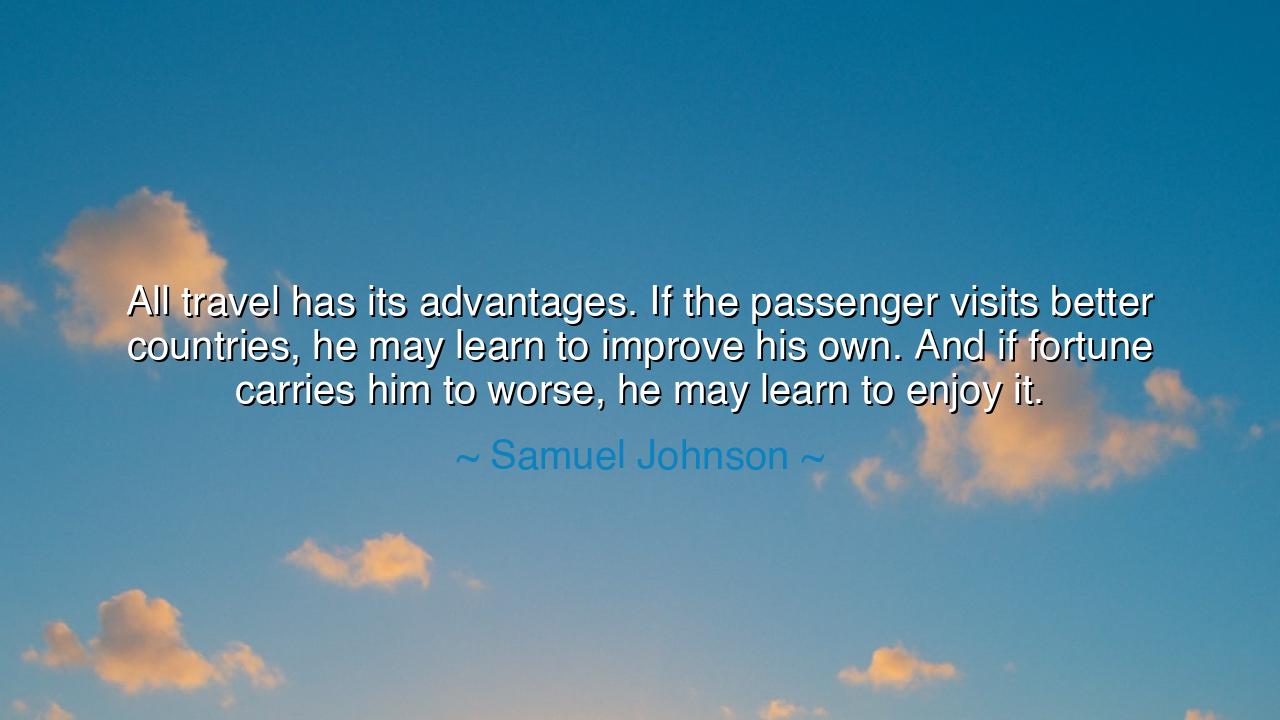
All travel has its advantages. If the passenger visits better
All travel has its advantages. If the passenger visits better countries, he may learn to improve his own. And if fortune carries him to worse, he may learn to enjoy it.






Hear the wisdom of Samuel Johnson, who declared: “All travel has its advantages. If the passenger visits better countries, he may learn to improve his own. And if fortune carries him to worse, he may learn to enjoy it.” These words are no idle musing, but the distillation of a lifetime of reflection, born of observation and sharpened by wit. They remind us that the road, whether smooth or harsh, is always a teacher; that every journey, whether through greatness or through want, can transform the traveler’s soul.
The first teaching is that when one visits better countries, when the eye beholds prosperity, justice, wisdom, or art beyond what one has known, there lies an opportunity for imitation. The traveler is not meant to be a mere admirer, but a student. To see what works in other lands is to gather tools for the shaping of one’s own homeland. Thus, travel becomes not indulgence but service, not escape but education. Johnson reminds us that envy is wasted, but learning from the better is wisdom eternal.
Yet he also speaks of the other road: when fortune carries a man to worse countries, where poverty reigns, or corruption festers, or comfort is scarce. Here, too, lies no curse but a hidden blessing. For the traveler learns gratitude, the art of contentment, the wisdom of simplicity. To endure worse conditions with patience is to strengthen the spirit; to see hardship in others is to awaken compassion. Thus, even suffering seen in another land may become food for the soul, teaching us to rejoice in what we already have.
History has often proven this truth. Consider Herodotus, the Father of History, who traveled through lands both mighty and broken. From Egypt he learned grandeur, from Babylon he learned folly, from smaller nations he recorded both virtue and corruption. His work did not merely describe, but taught the Greeks how to look at themselves in the mirror of the world. Likewise, Johnson’s words remind us that travel, whether through “better” or “worse” lands, sharpens our vision of our own life and country.
Think also of Mahatma Gandhi, who traveled as a young man to South Africa. There he witnessed injustice and humiliation worse than he had ever known. Yet from that experience, he drew not despair but resolve, fashioning the weapons of nonviolence and truth. Without that journey, India’s path to freedom might have taken a different course. Here we see the living proof of Johnson’s teaching: that worse conditions can forge greatness in the heart of one who dares to learn.
Thus, the meaning of Johnson’s saying is clear: all travel has its advantages, because life itself is a classroom, and the world is its textbook. Whether you see better or worse, the wise traveler returns not empty-handed, but bearing lessons. The journey is never wasted, for it always shapes perspective—teaching either how to improve one’s world, or how to cherish it.
The lesson for us is this: when you travel, do not go as a mere consumer of sights, but as a seeker of wisdom. Ask of every place: what can I learn here? If it is better, learn to imitate; if it is worse, learn to appreciate what you have. In practical terms: keep a journal of your travels, not of pleasures alone, but of lessons; look beyond the surface to the spirit of the people; and return home not only with souvenirs, but with insight.
Therefore, children of tomorrow, remember the counsel of Samuel Johnson: wherever you go, the road will teach you. Do not despise the journey to humble lands, nor idolize the journey to splendid ones. For both are teachers, and both can make you wise. Travel with eyes open, heart awake, and spirit willing—and you will find that the world, in all its contrasts, is a mirror in which you discover both your country and yourself.






AAdministratorAdministrator
Welcome, honored guests. Please leave a comment, we will respond soon